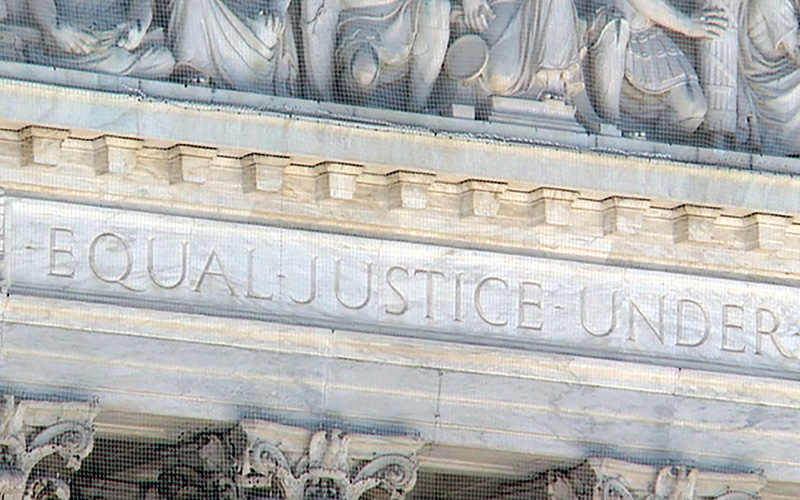
The Supreme Court voted 5-4 to uphold a law that lets the Department of Homeland Security hold immigrants without bail after their release from serving time for certain crimes, rejecting arguments that bail could only be denied in some situations. (Photo by Nathan O’Neal/Cronkite News)
WASHINGTON – The Supreme Court ruled Tuesday that some undocumented immigrants can be held without bail, possibly years after they have committed a deportable crime, while authorities determine their deportation status.
The 5-4 decision upheld a law that directs the Department of Homeland Security to hold immigrants without bail after their release from jail on a prior conviction. The justices rejected arguments by a group of immigrants that the 1996 law could only apply if DHS arrested them immediately upon release from jail.
Justice Samuel Alito, writing for the majority, said that would defeat the purpose of Congress, which passed the law to make sure authorities hold on to immigrants who might be dangerous or who might flee.
“It is hard to believe that Congress made the (Homeland Security) secretary’s mandatory detention authority vanish at the stroke of midnight after an alien’s release,” Alito wrote.
But Justice Stephen Breyer said that without applying some sort of time limit to the law, the court is giving DHS officials “authority to arrest and detain aliens years after they have committed a minor crime and then hold them without a bail hearing for months or years.”
“The aliens subject to detention without a bail hearing may have been released from criminal custody years earlier, and may have established families and put down roots in a community,” Breyer wrote. He said he fears the court’s ruling “will work serious harm to the principles for which American law has long stood.”
That fear resonated with Karina Ruiz, a Phoenix resident and beneficiary of the Deferred Action for Childhood Arrivals program.
“We’re always living in a state of limbo,” said Ruiz, a mother of three U.S.-born children.
“The Trump administration wants to scare us and give us laws that will make it harder to stay here with our children,” she said.
Arizona lawmakers did not immediately return calls seeking comment on the ruling. But in a friend-of-the-court brief filed in June, Republican Reps. Andy Biggs of Gilbert and Paul Gosar of Prescott joined other lawmakers who urged the court to reject a time limit in use of the law.
“This Court has repeatedly held that federal statutes stating that the Executive Branch ‘shall’ take action by a specified date should not be interpreted as a prohibition against taking that action after the specified date,” their brief said.
While most immigrants who face deportation proceedings can seek bail while their case is pending, the 1996 law requires DHS to hold “criminal aliens” after their release from prison and hold them without bail except in rare cases.
The law defined “criminal alien” as one who committed a drug crime or crime of “moral turpitude,” who has multiple convictions or is a known or suspected terrorist – or a family member.
Breyer said the law could sweep in everyone from a terrorist to someone caught “illegally downloading music or possessing stolen bus transfers,” as well as innocent spouses and children of a suspect.
In a concurring opinion, Justice Brett Kavanaugh rejected the suggestion that the law presented the court with a constitutional question about a right to bail, or even a question about whether immigrants can be detained or for how long. He called it a simple statutory question.
“The sole question before us is narrow,” Kavanaugh wrote, “whether … the Executive Branch’s mandatory duty to detain a particular noncitizen when the noncitizen is released from criminal custody remains mandatory if the Executive Branch fails to immediately detain the noncitizen when the noncitizen is released from criminal custody.”
He said a delay does not discharge that duty. That’s what Ruiz is worried about.
“It’s scary for me to think that I could end up in that situation where I am held indefinitely and have to endure that for a year just so I am not permanently separated from my children,” Ruiz said. “I mean, what would be the option that I have?”